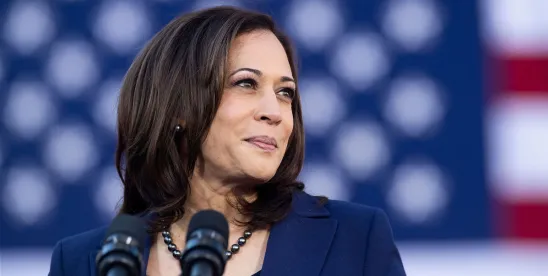Following President Biden’s withdrawal from the 2024 presidential race on Sunday, the nation’s capital has experienced another political shock, leading to swift mobilization within the Democratic Party. President Biden quickly endorsed Vice President (VP) Kamala Harris as the Democratic nominee, triggering a rapid wave of support from Congressional leaders, governors, stakeholders, and party donors including former Speaker Nancy Pelosi (D-CA), Senate Majority Leader Chuck Schumer (D-NY), House Democratic Leader Hakeem Jeffries (D-NY), all 24 Democratic governors, EMILYs List, and the United Auto Workers.
VP Harris has secured enough backing from Democratic delegates to clinch her party's nomination to challenge former president Donald Trump in November. With the election a little over 100 days away, we have highlighted VP Harris’ stance on key issues during her tenure in Congress and her 2020 Presidential bid.
Technology
VP Harris is very familiar with the tech industry due to her roots in Silicon Valley as San Francisco’s district attorney, and her subsequent roles as Attorney General and US Senator from California. Although she hasn’t called for the breakup of big tech like some of her former colleagues in the Senate, she has criticized tech CEOs for the data privacy practices and targeted advertising tactics that their companies deploy, and voiced support for general regulation of big tech firms. In the White House, she serves as President Biden’s lead on AI initiatives and has actively promoted policies aimed at mitigating AI risks such as algorithmic bias, disinformation, and privacy concerns, while maximizing its benefits for Americans.
Climate Change
VP Harris has a long history of challenging the oil industry for its role in pollution and is likely to take it a step further than President Biden in tackling climate change. In the 2020 Presidential race, Harris proposed a $10 trillion climate plan aimed at achieving a carbon-neutral US economy by 2045, featuring initiatives such as a climate pollution fee and the elimination of fossil fuel subsidies.
In the Senate, Harris authored legislation that would have authorized grants to fund projects that address the specific climate-related challenges faced by vulnerable communities and invest in critical upgrades to the nation’s water infrastructure.
As California’s attorney general, VP Harris brought lawsuits against major oil companies, including British Petroleum (BP) for failing to stop underground storage tanks from leaking gasoline at 800 sites across the state, and also filed an investigation into ExxonMobil over its climate change disclosures.
Health Care
Maternal health was at the forefront of Harris’ health care priorities during her tenure in the Senate and has continued in her current role as Vice President. She sponsored landmark legislation such as the Black Maternal Health Momnibus Act, aimed at tackling the crisis facing Black maternal health care. This legislation enhances data collection, expands access to prenatal, postpartum, and doula care in underserved communities, promotes implicit bias training for health care professionals, and funds research and innovation to improve health outcomes and reduce disparities for Black women. Although the bill was not enacted, it remained a priority in both chambers of Congress after Harris’ departure from the Senate. It is also the centerpiece bill of the Congressional Black Maternal Health Caucus. Harris also championed legislation aimed at addressing the impact of uterine fibroids on women's health through initiatives such as research funding, patient support tactics, and health care provider training. Additionally, she supported legislation to establish a loan repayment program for mental health professionals working in areas with critical workforce shortages.
In her 2020 presidential campaign, Harris introduced a health care plan that proposed a gradual transition toward Medicare-for-All over a decade. Her plan allowed individuals and employers to initially buy into Medicare while maintaining strict regulations for private insurance options. She also consistently opposed efforts to restrict access to reproductive health care services.
Tax
With numerous tax provisions under former President Trump’s Tax Cuts and Jobs Act set to expire in 2025, all eyes are on VP Harris' anticipated tax policy proposals. During her tenure in Congress, she championed a significant tax reform bill that would have introduced the LIFT credit—a refundable tax credit of $3,000 for single filers and $6,000 for married couples—benefiting a large portion of middle- and working-class Americans. Unlike the Earned Income Tax Credit (EITC), this credit's amount would not depend on the number of children reported on a taxpayer's return but would phase out as income increased. Harris emphasized that this credit aimed to boost families' after-tax income to help them cope with rising living costs.
Additionally, she sponsored legislation in Congress aimed at protecting workers from harassment and discrimination, funding earthquake mitigation efforts, and providing housing assistance to low-income families. During her 2020 presidential campaign, Harris advocated strongly for repealing Trump’s tax law. She proposed implementing a financial transaction tax to expand Medicare coverage and advocated for taxing capital gains as part of her broader economic platform.
A Look Ahead
With midterm elections looming in the House and 33 Senate seats up for election, the impact of VP Harris’ nomination on Congressional races will be watched closely. As the first woman of color and the highest-ranking woman in US history to hold the office of Vice President, Harris' nomination marks a pivotal moment in American politics. It may influence voter behavior, candidate strategies across the aisle, and the broader political landscape leading up to the November elections.
The Democratic National Convention (DNC) is scheduled to be held in Chicago, Illinois, from August 19 to August 22. However, due to upcoming state ballot deadlines which precede the convention date, a virtual roll call where delegates formally select Kamala Harris as the nominee will conclude by August 7. Harris is expected to choose her running mate in the coming days, as her campaign team has sent vetting materials to Arizona Sen. Mark Kelly, Michigan Gov. Gretchen Whitmer, Minnesota Gov. Tim Walz, North Carolina Gov. Roy Cooper, and Pennsylvania Gov. Josh Shapiro.





 />i
/>i
